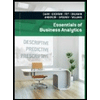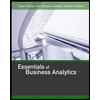
FINANCIAL MANAGEMENT: THEORY AND PRACTIC
16th Edition
ISBN: 9780357691977
Author: Brigham
Publisher: CENGAGE L
expand_more
expand_more
format_list_bulleted
Concept explainers
Textbook Question
Chapter 6, Problem 4P
An analyst gathered daily stock returns for Feburary 1 through March 31, calculated the Fama-French factors for each day in the sample (SMBt and HMLt), and estimated the Fama-French regression model shown in Equation 6-21. The estimated coefficients were ai = 0, bi = 1.2, ci = −0.4, and di = 1.3. On April 1, the market return was 10%, the return on the SMB portfolio (rSMB) was 3.2%, and the return on the HML portfolio (rHML) was 4.8%. Using the estimated model, what was the stock’s predicted return for April 1?
Expert Solution & Answer
Want to see the full answer?
Check out a sample textbook solution
Students have asked these similar questions
Given the solution with financial accounting question
Please provide contact solution with financial accounting question
Please provide problem with financial accounting question
Chapter 6 Solutions
FINANCIAL MANAGEMENT: THEORY AND PRACTIC
Ch. 6 - The probability distribution of a less risky...Ch. 6 - Security A has an expected return of 7%, a...Ch. 6 - If investors’ aversion to risk increased, would...Ch. 6 - Prob. 5QCh. 6 - Your investment club has only two stocks in its...Ch. 6 - Prob. 2PCh. 6 - Suppose that the risk-free rate is 5% and that the...Ch. 6 - An analyst gathered daily stock returns for...Ch. 6 - A stocks return has the following distribution:...Ch. 6 - The market and Stock J have the following...
Ch. 6 - Suppose rRF = 5%, rM = 10%, and rA = 12%. a....Ch. 6 - As an equity analyst you are concerned with what...Ch. 6 - Your retirement fund consists of a $5,000...Ch. 6 - Prob. 10PCh. 6 - You have a $2 million portfolio consisting of a...Ch. 6 - Stock R has a beta of 1.5, Stock S has a beta of...Ch. 6 - You are considering an investment in either...Ch. 6 - You have observed the following returns over...Ch. 6 - What are investment returns? What is the return on...Ch. 6 - Graph the probability distribution for the bond...Ch. 6 - Use the scenario data to calculate the expected...Ch. 6 - What is the stand-alone risk? Use the scenario...Ch. 6 - Your client has decided that the risk of the bond...Ch. 6 - Your client is shocked at how much risk Blandy...Ch. 6 - Explain correlation to your client. Calculate the...Ch. 6 - Prob. 8MCCh. 6 - Prob. 9MCCh. 6 - Prob. 10MCCh. 6 - Prob. 11MCCh. 6 - Calculate the correlation coefficient between...Ch. 6 - Prob. 13MCCh. 6 - (1) Suppose the risk-free rate goes up to 7%. What...Ch. 6 - Your client decides to invest $1.4 million in...Ch. 6 - Jordan Jones (JJ) and Casey Carter (CC) are...Ch. 6 - What does market equilibrium mean? If equilibrium...Ch. 6 - What is the Efficient Markets Hypothesis (EMH),...
Knowledge Booster
Learn more about
Need a deep-dive on the concept behind this application? Look no further. Learn more about this topic, finance and related others by exploring similar questions and additional content below.Similar questions
- I need help finding the accurate solution with financial accounting questionarrow_forwardI am looking for help with financial accounting questionarrow_forwardAssume the taxpayer does NOT wish to contribute to the Presidential Election Fund, unless otherwise stated in the problem. In addition, the taxpayers did NOT receive, sell, send, exchange, or otherwise acquire any financial interest in any virtual currency during the year. Keisha Sanders, a divorced single taxpayer and practicing attorney, lives at 9551 Oak Lane in Boise, ID 83709. Her social security number is 412-34-5670 (date of birth 2/27/1979). Her W-2 contained the following information: Wages (box 1) = $ 84,601.55 Federal W/H (box 2) = $ 8,278.51 Social Security wages (box 3) = $ 84,601.55 Social Security W/H (box 4) = $ 5,245.30 Medicare wages (box 5) = $ 84,601.55 Medicare W/H (box 6) = $ 1,226.72 In addition, Keisha made alimony payments totaling $11,100 for the year to her former husband Alex, an unemployed mine worker, whose Social Security number is 412-34-5671. This was in regards to a divorce decree that was completed prior to November 2017 and had not…arrow_forward
- Tyrone and Akira, who are married, incurred and paid the following amounts of interest during 2024: Home acquisition debt interest Credit card interest Home equity loan interest (used for home improvement) Investment interest expense Mortgage insurance premiums (PMI) Required: $ 10,250 3,100 5,105 8,200 1,000 With 2024 net investment income of $1,025, calculate (a) the amount of their allowable deduction for investment interest expense and, (b) their total deduction for allowable interest. Home acquisition principal and the home equity loan principal combined are less than $750,000. Deduction for investment interest expense Total deduction for allowable interest Amountsarrow_forwardReggie, who is 55, had AGI of $36,400 in 2024. During the year, he paid the following medical expenses: Drugs (prescribed by physicians) Marijuana (prescribed by physicians) Health insurance premiums-after taxes. Doctors' fees Eyeglasses Over-the-counter drugs Required: $ 585 1,485 1,300 1,335 460 285 Reggie received $585 in 2024 for a portion of the doctors' fees from his insurance. What is Reggie's medical expense deduction? Medical expense deductionarrow_forwardWhat is the difference between a bond's coupon rate and its yield to maturity (YTM)?no AIarrow_forward
arrow_back_ios
SEE MORE QUESTIONS
arrow_forward_ios
Recommended textbooks for you

 Essentials Of Business AnalyticsStatisticsISBN:9781285187273Author:Camm, Jeff.Publisher:Cengage Learning,
Essentials Of Business AnalyticsStatisticsISBN:9781285187273Author:Camm, Jeff.Publisher:Cengage Learning, Essentials of Business Analytics (MindTap Course ...StatisticsISBN:9781305627734Author:Jeffrey D. Camm, James J. Cochran, Michael J. Fry, Jeffrey W. Ohlmann, David R. AndersonPublisher:Cengage Learning
Essentials of Business Analytics (MindTap Course ...StatisticsISBN:9781305627734Author:Jeffrey D. Camm, James J. Cochran, Michael J. Fry, Jeffrey W. Ohlmann, David R. AndersonPublisher:Cengage Learning


Essentials Of Business Analytics
Statistics
ISBN:9781285187273
Author:Camm, Jeff.
Publisher:Cengage Learning,

Essentials of Business Analytics (MindTap Course ...
Statistics
ISBN:9781305627734
Author:Jeffrey D. Camm, James J. Cochran, Michael J. Fry, Jeffrey W. Ohlmann, David R. Anderson
Publisher:Cengage Learning
Portfolio Management; Author: DevTechFinance;https://www.youtube.com/watch?v=Qmw15cG2Mv4;License: Standard YouTube License, CC-BY